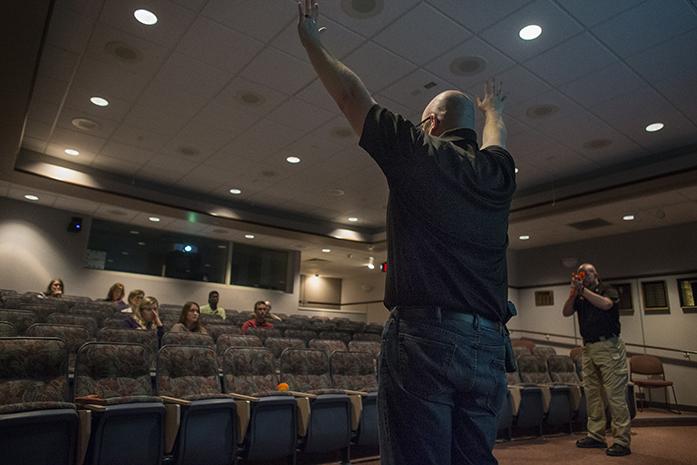Violent Incident Survival Training teaches students their options when it comes to survival techniques.
By Travis Coltrain and Wyl Smith
Although last weekend’s Burge active-shooter “prank” ended with a misdemeanor charge, more direct threats can end in terrorism charges, officials say. To counter this, programs such as the University of Iowa police’s Violent Incident Survival Training exist.
The training is an interactive program that teaches survival techniques in an active-shooter situation.
UI student Harrison Tsimouris, 18, a resident of Burge, was arrested Oct. 15 after reportedly confessing that the text message he sent was intended to be a prank. He was charged with filing a false report to a public entity, a misdemeanor. According to the UI police, a more direct threat could be charged as terrorism.
“In most cases, people would think of terrorists as ISIS,” said Johnson County Sheriff Lonny Pulkrabek.
Another situation similar to the Burge incident recently arose in Iowa City as well. The Sheriff’s Office charged Sarrina Bancroft, 21, with making threats of terrorism.
“She was charged because she made these threats to specific people,” Pulkrabek said.
Bancroft threatened to hunt down families, and kill their children and spouses, of anyone involved with a case relating to her son, including the Iowa Department of Human Services workers and Johnson County court attorneys and judges.
“Depending on their intent, if they are going to cause fear, it can be considered terrorism,” UI police Lt. Eric Werling said.
Pulkrabek clarified the two cases can’t be tied together in any way, because they are “completely unrelated and completely different” situations.
“She made threats to people who were dealing with her child,” Pulkrabek said. “He sent a friend a text saying there’s an active shooter at the dorm.”
Active-shooter events, although uncommon, do occur, Werling said, noting that all active-shooter events are different and unpredictable.
“You know, we can do hypotheticals all day, but every situation is going to be unique, and you have to look at the facts of each situation to make a decision on what should be done or what to do,” Pulkrabek said.
In the training, people can learn the options of what to do in violent situations. During the class, Werling continually said he wouldn’t tell people what they should do in this situation, because every one is different. Rather, he will give options of what people can do.
“We don’t rise to the occasion, we sink to the level of our training,” said UI police Officer Jess Bernhard. He said with this training, people can be more prepared for any situation.
In the program, officers teach participants about “Alice,” which stands for “Alert, Lockdown, Inform, Counter, and Evacuate.”
“Figure out what job in Alice is best for you,” Werling said. “Each piece of Alice doesn’t need to go in that order.”
“Alert” simply means call 9/11 when it is safe to do so. Bernhard said while it might seem obvious, some people won’t do it.
“I think people should call the police in a situation like that,” Pulkrebek said. “I think that if someone is aware of someone planning a terrorist act, or witnessing something, then they should call the police.”
“Lockdown” means to protect yourself from the threat. Ways to do this include turning off all the lights, blocking the windows, and not allowing the door to be opened.
“Three in 10 people are going to do something, but there is a job for everybody,” Werling said.
“Inform” means staying in the loop of what is going on in the area. If you get a HawkAlert make sure to react appropriately. Pay attention to any new information that might come along, and pass along any information you might have.
“We’re looking for what everyone else is: more info,” Bernhard said.
Counter means to be prepared for the worst, such as your lockdown area being breached. If this happens, officers encourage you to attempt to subdue the attacker. Using objects around you to throw at them, then swarming the attacker and not allowing them to move can be very effective.
“In the meantime, y’all are the first responders until we arrive,” Bernhard said. “You are in the hot zone, and we want to get you in the cool zone.”
“Evacuate” means to get out safely. Running erratically makes you a lot harder to hit, considering that bullets fly straight.
“If you can get out safely, do it, but be aware of your surroundings,” Bernhard said.



